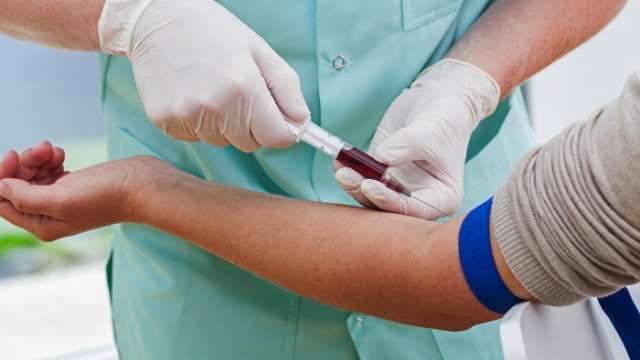Blood test which confirms prostate cancer could prevent 70pc of biopsies

Nearly 50,000 men are diagnosed with prostate cancer every year in Britain, while many thousands more will develop symptoms which will turn out to be harmless.
“This test has the potential to spare men with non-cancerous disease or low-risk cancer from unnecessary invasive diagnostic procedures and tests,” said Professor Masood Khan, consultant urologist at University Hospitals Leicester NHS Trust and Visiting Professor at Nottingham Trent.
Men are currently screened for the potential presence of prostate cancer using a blood test which look for prostate specific antigen, a biomarker which rises when the disease is present the ‘prostate.
However, readings vary between individuals and naturally rise as people age.
The current test is further complicated by the fact that elevated levels of the antigen do not necessarily mean that the man has prostate cancer while a normal reading does not exclude its presence.
The new test, which has so far been trialled using samples from 72 men, would be used following a PSA test to help doctors decide whether a high PSA reading really does mean cancer.
As well as being able to discount cancer altogether, it has the potential to spare men with no cancer, or low-risk cancer, from having to undergo biopsies and other diagnostic procedures and tests.
“Although the PSA blood test is commonly used to test for the presence of prostate cancer, it can be relatively non-specific,” said Professor Graham Pockley, Director of Nottingham Trent University’s John van Geest Cancer Research Centre.
“A particular challenge to the clinician is diagnosing the presence of prostate
cancer in individuals who do not have symptoms of the disease, but do have a mildly elevated level of PSA in the blood. This study highlights the value of collaborations such as these.”
The new test monitors white cells in the blood, which are responsible for protecting the body against infection and cancer. Scientists have developed an algorithm which determines whether cancer is present based on how the cells are reacting.
Currently, under current government guidelines, men aged between 50 and 69 who have a PSA reading of 3 more are usually sent for a biopsy. But the new test could prevent 70 percent of operations, which would also bring savings for the health service.
The researchers also warned that it is essential that men with low-risk prostate abnormalities are not diagnosed as having prostate cancer which can have adverse psychological and financial consequences and assign these men to unnecessary life-long surveillance.
Prostate biopsies are also associated with a five percent risk of urosepsis, a dangerous condition, a severe infection of the urinary tract which can be fatal.
The research team is now looking for funding for the next stage of the project, which would involve confirming these results in a larger number of patients and determining whether the same approach can be used to distinguish aggressive from a non-aggressive disease.
Charities said the research was a step in the right direction.
Dr Richard Roope, Cancer Research UK’s GP expert, said: “This research could help spare people who don’t have prostate cancer from further tests.
"But it can’t yet tell the difference between life-threatening cancers or harmless ones that can be left alone. This is a step in the right direction, and we look forward to more results from this kind of research.”
The work is reported in the international journal Frontiers in Immunology.
The original article was published in the Telegraph.









-1745485667.jpg&h=190&w=280&zc=1&q=100)





































